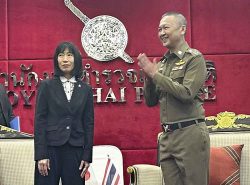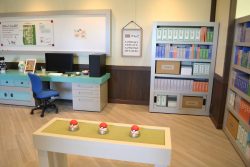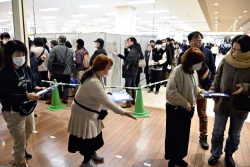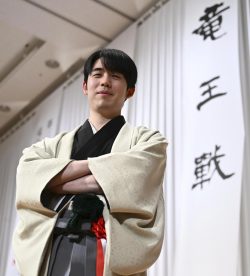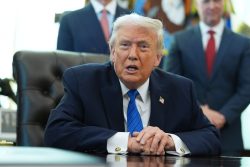Med School Took Donations From Test-Takers’ Relatives; Listed on Score Sheet With Entrance Exam Results

Sections to disclose the amount of donations are seen on an application form that would be submitted to the Shiseikai Association alumni group of Tokyo Women’s Medical University.
18:26 JST, June 23, 2024
Tokyo Women’s Medical University (TWMU) accepted donations from the relatives of people taking a special entrance exam meant for such candidates as alumni’s children and other family members, it has been learned.
The university’s Shiseikai Association alumni group, which screened candidates’ eligibilty to take the special exam, also received donations, The Yomiuri Shimbun has found. A total of at least about ¥34 million was given to both the university and the association over the entrance exam periods between 2018 and 2022.
The Education, Culture, Sports, Science and Technology Ministry bans universities from receiving donations in connection with entrance exams. It has called on the university to report on the allegations.
The entrance exam system in question started in 2018. To qualify to take the special exam, candidates must have a third-degree or closer relative who is a TWMU graduate or current student, and receive a recommendation from Shiseikai. Graduates are regular members of the alumni association, while current students are associate members.
The alumni association accepted requests for recommendations from around early September each year, conducted both written exams and interviews in late September, and selected about 10 students to be recommended to TWMU. The recommended students took the entrance exam in November, the outcome of which determines whether they are admitted.
According to TWMU and other sources, a total of 57 students applied to Shiseikai for a recommendation between 2018 and 2022. A total of 39, or less than 70% of the applicants, were recommended to the school, and 37, or 95% of those recommended, passed the entrance exam.
Informed sources said candidates must disclose on their application form to Shiseikai how much was donated to TWMU or the alumni group.
The Yomiuri Shimbun’s analysis of internal documents showed that between 2018 and 2022, the university received at least ¥16.3 million in donations from relatives of eight students from August, about one month before Shiseikai started accepting applications, through early December, when the results of the entrance exam were announced.
Shiseikai separately received a total of ¥18 million in donations from relatives of 18 students during the same period. Four relatives made donations to both TWMU and Shiseikai.
In the screenings for recommendations in 2019, 2020 and 2022, the donations were turned into scores referred to as the “degree of contribution.” These figures were included on score sheets that also included the results of interviews and written exams.
University directors who also served as Shiseikai board members handled the screenings for recommendations. In 2018, TWMU Chancellor Kinuko Iwamoto, who then served as Shiseikai’s chairperson and the university’s deputy chancellor, took charge of interviewing applicants.
Shiseikai dismissed Iwamoto as its chair in April 2023. Starting this fiscal year, the university changed the entrance exam system for selected candidates recommended to the school to a system in which Shiseikai was not involved.
In October 2002, the education ministry issued a notice under the name of the administrative vice minister, banning the receipt of donations in connection with private universities’ entrance exams.
Ministry officials said they uncovered the problem around April this year and asked the university to report the results of its investigation.
In response to an inquiry from The Yomiuri Shimbun, the university answered in writing, “We have not asked specific individuals for donations, and we are not aware of having violated the education ministry’s notice.”
Top Articles in Society
-

JAL, ANA Cancel Flights During 3-day Holiday Weekend due to Blizzard
-

Australian Woman Dies After Mishap on Ski Lift in Nagano Prefecture
-

Record-Breaking Snow Cripples Public Transport in Hokkaido; 7,000 People Stay Overnight at New Chitose Airport
-

Foreign Snowboarder in Serious Condition After Hanging in Midair from Chairlift in Nagano Prefecture
-

Train Services in Tokyo Resume Following Power Outage That Suspended Yamanote, Keihin-Tohoku Lines (Update 4)
JN ACCESS RANKING
-

Univ. in Japan, Tokyo-Based Startup to Develop Satellite for Disaster Prevention Measures, Bears
-

JAL, ANA Cancel Flights During 3-day Holiday Weekend due to Blizzard
-

China Confirmed to Be Operating Drilling Vessel Near Japan-China Median Line
-

Japan Institute to Use Domestic Commercial Optical Lattice Clock to Set Japan Standard Time
-

China Eyes Rare Earth Foothold in Malaysia to Maintain Dominance, Counter Japan, U.S.



